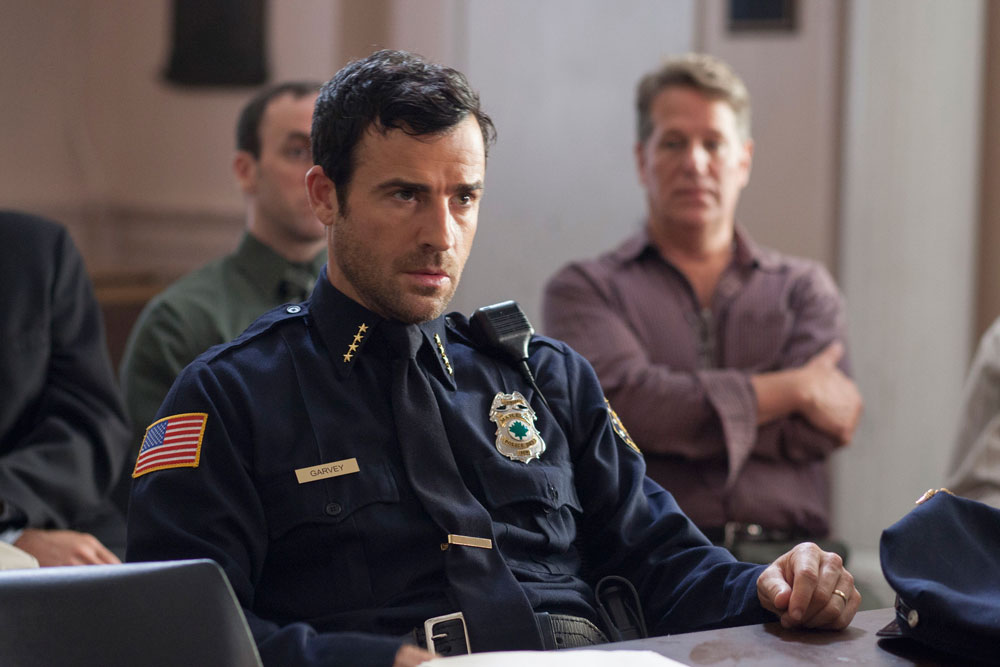 Justin Theroux in HBO’s “The Leftovers”
Justin Theroux in HBO’s “The Leftovers”
In the grand tradition of risk-taking television and the pushing of envelopes, The Leftovers seems determined to figure out just how much misery the average viewer will consider entertaining. Starting with the premise – a world in which 2% of the population simply disappeared, Rapture-style, leaving behind a bunch of seriously depressed survivors – and then following through in all the morose character work, it’s the television equivalent of a kid in the backseat of a car, constantly poking his sibling to see how far he can go before she starts howling and crying.
Not that there’s anything child-like about this show. Quite the contrary, it’s as adult as a show can get, exploring themes of loss and hopelessness on a grand scale -which is why this first episode is such a slog to get through. We’re helped along by some very good performances (although like everything else we’ve ever seen Justin Theroux do, we spent most of the time watching his performance and thinking he needs to switch to decaf) and beautiful photography, but in the end, we’re stuck with an hour-plus of really damaged people acting like assholes for reasons that aren’t particularly clear. And while we shouldn’t expect much in the way of clarity this soon in the story (or possibly ever), the problems with the show are making that ambiguity a little tough to swallow.
For one, the central family in this story is one of those TV drama families where all the members look like TV stars. That shouldn’t bother us so much except when the constantly drunk, meatloaf-eating father of the family keeps getting opportunities to show off his shaved chest and visible abs. It tends to work against any raw grittiness you’re trying to sell to the audience. Second, it’s not particularly innovative anymore to filter a worldwide catastrophe through the lens of small town America (let alone a single family). In fact, it’s a huge cliche. It’s early days, of course, but we get the impression that the only information we’re ever going to get about the rest of the world will be told through the hoary old trope of constantly having cable news playing on TVs in the backgrounds of all the scenes. Third, it’s another of those “a Really Bad Thing happens – and then society just gives up” stories that tend to irritate us. At least in The Walking Dead, an actual apocalypse happened. It’s kind of hard to consider an event that 98% of the population survived to be apocalyptic. Weird and frightening and even traumatizing, sure. “Let’s all give up, join a cult, and start shooting dogs in the street?” Human beings have gone through countless periods of history where they were literally tripping over all the dead bodies piling up in the streets – and society, for the most part, kept going. We’re gonna need a little convincing here.
And that’s actually fine. The show has a quiet confidence that’s appealing; like it knows exactly where it wants to go and trusts in itself that it will get the audience there soon enough. Certainly, co-creator Damon Lindelof knows a thing or two about how to dole out information slowly, going by his time as one of the co-creators and chief architects of LOST. But Lindelof also has a reputation for being too obtuse; for relying too much on mystical hand-waving as a way of explanation (see: the execrable Prometheus), and for ignoring that which his audience wants most: answers and resolution. Four years after the LOST series finale, its reputation as a legendary bungle in the history of television has only grown. (As an aside, it’s not a view we share, as we loved LOST from beginning to end, but we were recently compelled to watch the entire series again and when you have the whole story, certain things are improved in the earlier seasons and certain other things fall apart. We’re planning on revisiting LOST as a series in a post soon.)
But it also has to be said that LOST still has its well-deserved reputation for creating fascinating, engrossing characters and then telling beautiful, sometimes heartbreaking stories about them. Lindelof may not be good about answers (which means this show is probably right for him, since it seem unconcerned with offering many), but he’s excellent at creating and nurturing characters you can’t help but love or care deeply about. On that level, this is a show worth looking into. It has a very good cast, a worthy pedigree, and an interesting (if not as fascinating as the show seems to think) premise. It’s worth tuning in to see where it’s going to go. But it’s not, in the strict sense of the word, entertaining. It would be silly to ask of levity from a story like this, but we sincerely hope every episode isn’t going to be stuffed to the rafters with grieving mothers and dogs being shot. Laugh-out-loud moments should not be expected, but we question whether there’s an audience that wants to spend every Sunday night getting deeply depressed.
[Photo Credit: HBO]
Chloë Moretz in Dolce&Gabbana at the 2014 Saturn Awards Next Post:
Kerry Washington in Dolce&Gabbana at the 2014 BET Awards
Please review our Community Guidelines before posting a comment. Thank you!



